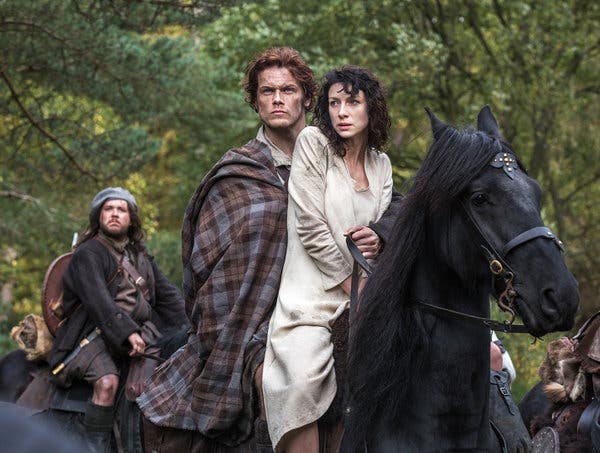by Bryan Caswell & Heather Clancy
Years ago, in a certain common room in Gettysburg, Pennsylvania, Heather’s roommate and our close friend Sarah showed Bryan an episode of that historical phenomenon known as Outlander. At the time, he wasn’t impressed; the referendum on Scottish Independence was looming, and the show seemed like nothing more than, in the words of another of our friends, “Jacobite propaganda.” Years and one global pandemic later, however, Outlander can now be found on Netflix, and as diligent students of history, we decided to give it a try. We can confidently say that never has a period piece left us more conflicted.
Outlander is a shining exemplar of the recent trend known as ‘dark history.’ Dark history attempts to rectify decades of historical romanticism in visual media by doing the opposite: history is now dirty, gritty, and brutal. In the case of Outlander, these principles are combined with the story-telling conceit of time travel. Based on the book series by Diana Gabaldon, Outlander follows the life of Claire, a British nurse from the Second World War who is accidentally transported back in time to 1743 while on her honeymoon in the Scottish Highlands. Thrown into the midst of the Jacobite Rising of 1745, Claire falls in love with a strapping Scotsman named Jaime. The ensuing five seasons (to date) see Claire build multiple families and negotiate multiple loves and lives across centuries and continents.
The history that Claire lives through is both immersive and largely impressive in its accuracy. Numerous plot points literally depend on getting the history right, and the show’s material culture both in Claire’s native twentieth century and Jaime’s eighteenth is fantastic. Look no further than the show’s theme to draw you into its eras, changing from Gaelic pipes and drums to island rhythms to backwoods strings to fit the setting of each season. The subjects that accompany this atmospheric triumph are also welcome. It is not often that the ‘45 Rising gets such popular exposure (despite its rather one-sided presentation), and a focus on the horrors of colonial slavery (as opposed to antebellum slavery) is also appreciated, despite some unfortunate threads of the happy slave narrative also worming their way in. This is the extent of the show’s diversity, however. All main characters are white, with characters of color only playing minor and sporadic roles despite the last three seasons occurring in close proximity to both the slave society of the colonial South and the neighboring Native American tribes of the interior.
When you combine this immersive and largely accurate dark history with time travel, however, you find one of the best demonstrations of why time travel is a Bad Idea, as Outlander is also one of the most emotionally disturbing shows we have ever experienced. Claire is a native of more enlightened times than the eighteenth century, and so in departing the mid twentieth century she leaves a world of relative safety and growing rights for women and is thrust into a time of oppression, misogyny, and widespread personal violence. Outlander makes this explicitly clear in what soon becomes a harrowing gauntlet of trauma. Indeed, Outlander is an extreme representative of the worrying trend in premier television to use sexual violence in service of its stories. Multiple occurrences of sexual violence can be found in every season, often graphically portrayed on screen (alongside countless other instances of torture, mutilation, and other physical violence). One wonders why every single member of the main family must be raped to move their story forward. ‘Distasteful’ is a gross understatement.
Given the horrors the characters endure, other uses of Outlander’s inherently anachronistic and relativist perspective seem tone deaf, to say the least. Claire continues to make waves in the eighteenth century even after being warned not to by a fellow time traveler, almost being burned at the stake as a witch, and ultimately living in her new era for decades. In fact, Outlander is at its heart a supremely un-feminist show, as its foundational romance relies on a woman voluntarily giving up her legal and civil rights for a man who lives in a time period that will force her to become his property and live as no more than a literal housewife. Claire is also mystifyingly not the only modern character to make this choice, leaving both of us wondering if the writers are pastoralists who for some reason dislike running water, waste disposal, sanitation, and modern medicine and transportation.
While we think we can say we both enjoyed Outlander in the final accounting, we also cannot in good conscience recommend it to others without warning, for all the reasons we’ve discussed above. Some may find it an enthralling work of historical fiction; others might see it as a revolting, even triggering, piece of voyeurism. To us it has been both simultaneously. For those who wish to experience it for themselves, be prepared, and maybe don’t watch before bed.
